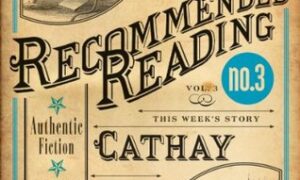 Who’s Who When Everyone Is Someone Else by C.D. Rose
Who’s Who When Everyone Is Someone Else by C.D. Rose
My rating: 3/5 cats



I hate myself when I lack conceptual guts, frets the protagonist of this book, but that weakness is not one that affects the author.
this is a short novel connected to the author’s first book, The Biographical Dictionary of Literary Failure; set in an unnamed, “small and somewhat remote city in central Europe,” the fictional editor of b.d.o.l.f. is called upon to deliver, a series of ten lectures on lost, forgotten or unjustly neglected books (rather than lost, forgotten or unjustly neglected writers, which had been my previous field.)
what follows are the transcripts of those lectures, books that do not exist, but many that sound so much fun you wish they did (in other words, the exact same thing as The Biographical Dictionary of Literary Failure) and in between those lectures, the author has a book-adventure that reads like a pig pile of borges, calvino, zafon, kafka, and is pretty much exactly what you’d expect – absurd and meandering, full of wordplay and allusions and enough references you’ll catch to know there’s many more you’re missing.
it’s clever and fun, but i found i never wanted to read more than a few pages at a time. my tolerance for the absurd has lessened as i’ve gotten older, so it worked better for me in smaller chunks, and i think i would have preferred a book more that closely mirrored the Dictionary; a series of lecture transcripts about imaginary books. he’s so good at coming up with plots, concepts and authors that i don’t need action and adventure. books are enough. which he should get, since he’s also very good at getting to the essence of what makes a booknerd tick:
For many of us, books are our childhood friends and formative experiences. It was an early encounter with a book which, I suspect, had led me to where I found myself right at that moment.
The problem is, I cannot remember which book.
As a just-literate child, I had once come across a book in our local library that possessed me. I remember little to nothing of its plot, none if its characters and scarcely any of its words, let alone its title or author, yet that book has haunted me ever since. I remember it as filled with smoke and fire, shadow and flame. I remember its utter mystery and infinite possibility. I was lost, captivated.
The book, of course, had to be returned to the library, and each week I went back there, hoping to borrow it again. I never did. I picked out book after book after book and scoured their pages and pictures and jackets, trying to find a turn of phrase or an illustration I recognized, something which brought the story back to me, but even though I sometimes came close, I never found it again.
I have been looking for that book ever since.
that longing for a forgotten childhood book, the quest for the “original” book in If on a Winter’s Night a Traveler, the forgotten or destroyed imaginary works rose dreamed up for his two books – it’s all tied to the a reader’s sense of closure and satisfaction being thwarted by circumstances and it’s a very specific haunting itch, which he understands and exploits.
it’s overall light and fun, and it’s winkingly self-referential, as when he addresses a particular literary device in one of his lectures:
Then, of course, there is the book-within-the-book, a device which may look potentially hackneyed today, but seemed so radical as to be off-putting for contemporary readers…The use of the device is, however, far from hackneyed in this book, and thus I have chosen to lecture on it today.
there are imaginary books with great titles, like This Dark Night Has Given Me Black Eyes by Agnar Landvik, which has an even greater story behind the scenes, there’s some breathy near-pornographic appreciation of punctuation:
”I love the way he punctuates.”
“He certainly has a way with a semicolon.”
“You like the semicolon?”
“Oh God, yes.”
“Mmm, me too. It’s such a rare thing, and so lovely to find someone who likes the semicolon.”
“It’s hard to find someone who can use it so well.”
“I love how it separates, yet joins.”
there are lovely descriptions in both the physical world:
The same shabby boxes sat in the opened boot, holding what initially looked like the same books, all broken spines, mildew and sadness.
and of the psychological composition of the booknerd:
We were all people that had made ourselves, or each other, up, based on the books we had read. What other way, I wanted to ask, is there to negotiate the real? What other way to be?
plus, some enviable economy of prose:
Time passed, whatever.
i’ve quoted a lot, because it’s a fun book to quote, and even though i “only” gave it a three, it’s a high three, and it’s more to do with my flickering attention span and the way this book made me drift off into different bookish thoughtspaces than it not being enjoyable.
both this book and the Dictionary before it are wonderful at summarizing books i’ll never read, but that i can’t feel bad about not reading on the grounds that they don’t exist. i creep quietly away from reviewing this book with one final, overlong quote because it speaks to all of us:
Why do we pretend to have read books we haven’t?
There is surely no shame. A million new books appear every year and we cannot possibly have enough time to have read them all. And there are so many competing demands, after all: I need time to stare out of the window, idly look at newspapers and smoke cigarettes. Do we so desperately need to stay modish, to have a voice in the cultural conversation? Entire other books have been written telling us how to pretend to have read those we have not. I do not hold with these. I do not lack confidence: I am proud to say I have not read certain things. The unread, after all, still contains its infinite promise.
And yet, and yet, and yet: the words escaped me.
Oh mouth mouth mouth.
Oh drink drink drink.
Oh books. Books books books. There are too many of you. I love you but you overwhelm me. I just need some space sometimes, that’s all.All of us have that guilty pile: the ones we genuinely want to, the ones we think we ought to, the ones we’ve tried and promised to return to. It grows ever bigger: books proliferate, multiply, swarm, breed each other, parthenogenerate like those strange plants or rare insects which reproduce without sex. Or perhaps books do have sex? Quietly, when we aren’t looking, making no fuss and leaving little mess but spawning rapidly.







